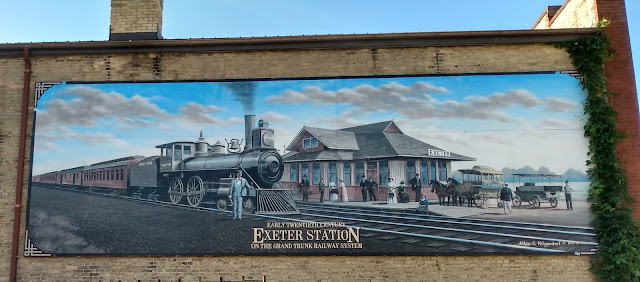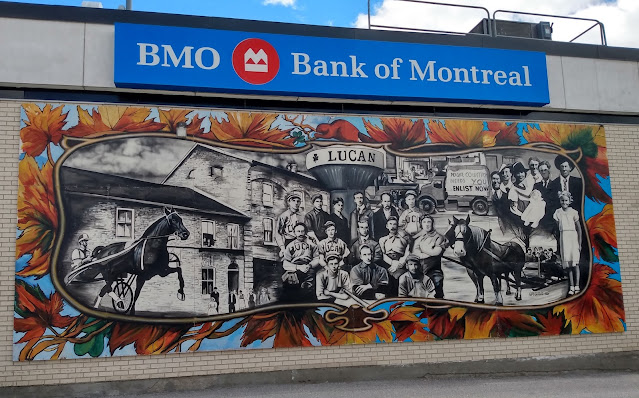This summer a friend and I were fortunate enough to get a rare behind-the-scenes tour of Arva Flour Mills from its new owner. I say fortunate because it's not everyone who's had a chance to view the antique milling equipment inside this pioneer building on the banks of Medway Creek. I say rare, because most visitors only see the workings through a door while shopping in the attached store. But I have friends in high places: my travelling companion once worked with owner Mark Rinker's dad, Fred. They got chatting, and the rest is history.
Mark, who purchased the business from Mike Matthews in 2021, has done his research and believes the mill, established in 1819, is Canada's sixth-oldest continuously operating business. And perhaps the oldest food-producing company in Canada too. Most historians agree that Arva Flour Mills is North America's oldest continuously-operating, water-powered commercial flour mill.
 |
| Pioneer tool marks on an interior beam. |
In early twentieth century, the original grist millstones were replaced with roller mills made by Goldie and McCulloch of Galt (now Cambridge), state-of-the-art technology for the era. At the same time, an outside water wheel was changed to an underwater turbine. For the most part, the mill operates the same way as it did in the early 1900s, half run by water power, the rest by electricity.
The equipment allowed the mill to produce 30,000 pounds of flour a day, much of which was purchased by McCormick's in London. With little competition and a major company as a customer, there was probably little need to update equipment, which is why the mill is a rare operating antique in the twenty-first century.
While there have been many owners over the years, the family of Mike Matthews operated the mill for over four generations since 1919. That must be some kind of flour mill record.
As I mentioned in a previous post on mills, Arva Flour Mills was shut down by a federal safety inspector in 2017. The inspector was concerned that the old equipment, with its exposed rollers and belts, was a hazard for workers. This despite the fact that Mike and his workers were highly trained on the use of their machinery. Fortunately, common sense prevailed and a federal tribunal later overturned the ruling. The mill was allowed to operate again on the understanding that no workers, not even the owner, are allowed in the upper level of the mill when the equipment is running. Fair enough.
 |
| Mark Rinker shows off his equipment. |
Using wheat from local farms, the old roller mills produce a "heritage flour" with no preservatives or undesirable commercial additives. The store sells flours, mixes for beer bread and cornbread, and red fife pancake mix as part of the Arva Flour Mills brand. Mark also bought the Red River Cereal brand from Smuckers Foods of Canada which had stopped selling the brand last year. Created in Manitoba in 1924, the cereal was named after the Red River near Winnipeg. The recipe included cracked wheat and rye but was altered about ten years ago to include steel-cut wheat instead. Mark's historic business is now producing the original recipe on site. The cereal is now available at the mill store and beyond.
For such an old business to be booming is fabulous for Mark and his family but also for the community of Arva, the wider London region, and heritage preservationists. The mill's continued success under sympathetic, enthusiastic management proves that not everything old needs to be demolished.
 |
| Arva Flour Mills remains a significant and valuable Southwestern Ontario landmark. |







.jpg)

.jpg)




































